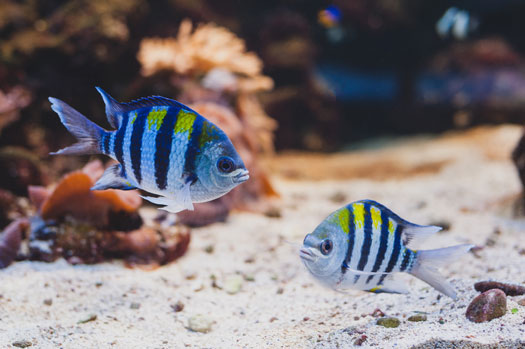- Your shopping cart is empty!
What Types of Detritus Are Common in Aquariums?

In a saltwater or freshwater aquarium, detritus is unavoidable, as it’s a natural part of the tank’s inner life cycle. Detritus is composed of decaying dead animals, plants, or other organic matter that resides at the bottom of a fish tank. While this may not sound ideal, it’s unavoidable yet treatable. First, it’s important to identify the type of detritus found at the bottom of your fish tank.
Organic Materials
A majority of the common detritus found at the bottom of a fish tank is likely being formed by animal byproducts from the fish. Mucus and excess cells can build up at the bottom of a tank, just as dead skin cells build up in the form of dust around a house. Provided it’s not taking over the tank, this type of detritus is likely going to be valuable to your tank’s ecosystem, providing a good amount of nutrients for its denizens.
Inorganic Materials
Similarly, further buildup can occur when mineral grains aren’t digested by your fish and reside at the bottom of your aquarium. This can also occur when animals burrow in live rock or coral skeletons.
At Aquatic Warehouse, a trusted aquarium supplier, we can provide what you need to maintain your tank and avoid detritus buildup so your tank’s inhabitants remain healthy.
Detritus Worms
Detritus worms are thin and easily distinguishable from other types of common detritus, and they’re beneficial to have in your tank because they’re detritivores, meaning they eat other kinds of detritus that could lead to unhealthy bacterial buildup. These worms make it a point to eat decomposing organisms in a tank, such as dead plants and decaying animal materials. They may appear seemingly from nowhere if you’ve recently added new plants or animals to your tank, as they can be transferred in with them. However, as previously noted, they’re not bad for a tank and won’t disturb any of the natural ecosystems within the space. Instead, if they have nothing else to eat, detritus worms will live off of gravel and other debris cast off from your fish, keeping your tank clean and running smoothly.
Planaria Flatworms
These worms can be harmful to a tank, depending on the population of fish you’re keeping. Freshwater planaria flatworms are carnivores and tend to eat the eggs of other fish, as well as small fish themselves. If you’re attempting to breed more fish and would like to keep their eggs around, you won’t want to keep planaria flatworms in your tank for an extended time. Make sure you’re not confusing planaria with detritus worms before attempting to remove them from your tank, as the treatments may prove to be harmful to your thriving fish.
Keeping detritus to a minimum is just one of the many tasks when caring for an aquarium. You’ll also need to keep up on various supplies to maintain the tank. Get in touch with Aquatic Warehouse today. Stop by our store in Kearny Mesa, check out what we have to offer online, or give us a call at 858-467-9297.
